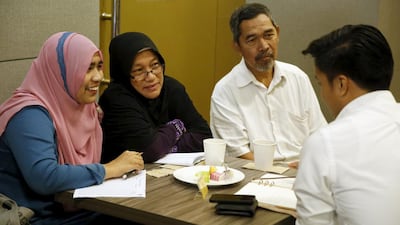There was a time when looking for love online was considered to be only for sad, lonely people. Oh, the shame of it! In some quarters, the idea of using strategy rather than serendipity was considered heartless and cold. Or, by contrast, when obeying familial edicts on whom and when to marry was something accepted as par for the course and choice was an unknown criterion.
Thankfully, those times are slowly passing. The strategic, self-confessed, self-directed search for a partner is a growing phenomenon. This has been helped in great part by dating and marriage apps. Chance is out the window and, instead, proactive choice is the rage. But amid the apps like Tinder and Happn, there’s another way of finding love that’s making headlines: halal speed dating.
An organisation in Malaysia has been gaining wide news coverage for its events aimed at bringing together Muslims seeking marriage in the hopes of finding their true match. It says it ensures that Islamic edicts are followed, so the woman’s guardian is present and all contact is supervised.
I’m surprised that this event has received global news coverage, or that it is news at all. After all, events of this sort for Muslims have been going on for over a decade. I wrote about my own experiences in the early noughties in my 2009 book about my search for love.
It seems that “halalifying” love still makes for big news. It’s a perfect storm of shock: young Muslims who want to uphold the tenets of their faith, but take personal choice in whom their partner will be; who want to be observant, but not use traditional methods of search; and for whom family connections and obedience are less important than securing a partner of similar values and outlook.
Malaysia is the country that has inspired the “Sorry Valetines, I’m Muslim” campaign, where young Muslims refuse to participate in the February 14 celebrations, so perhaps the profile of the halal speed dating event has captured imaginations, confirming that Muslims really do believe in looking for love.
But what I want to know is how far such initiatives will go towards erasing the power imbalance between men and women in the search for marriage that still persists in many Muslim cultures. Women are often disparaged for openly seeking marriage.
The results of these halal speed dating events are a case in point. The early events seem to have been dominated by women, a trend that is consistent around the world. Even the organisers seem horrified that one event had a ratio of three women to one man. The recent event that triggered all the coverage had 22 men to 27 women, although the age ranges seemed to be out of kilter: younger men, older women, the former not interested in the latter.
There was a time when women weren’t allowed to be openly interested in marriage, and if they openly demonstrated this desire, they were considered to be “desperate”.
Let’s hope that events that make men and women equal will eradicate this imbalance of power and shame, and give women a freer platform for seeking marriage.More importantly, they can establish that the idea of Muslims looking for love is just the norm. After all, Muslims want to be loved too.
Shelina Zahra Janmohamed is the author of Love in a Headscarf and blogs at www.spirit21.co.uk

